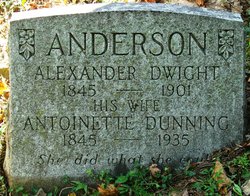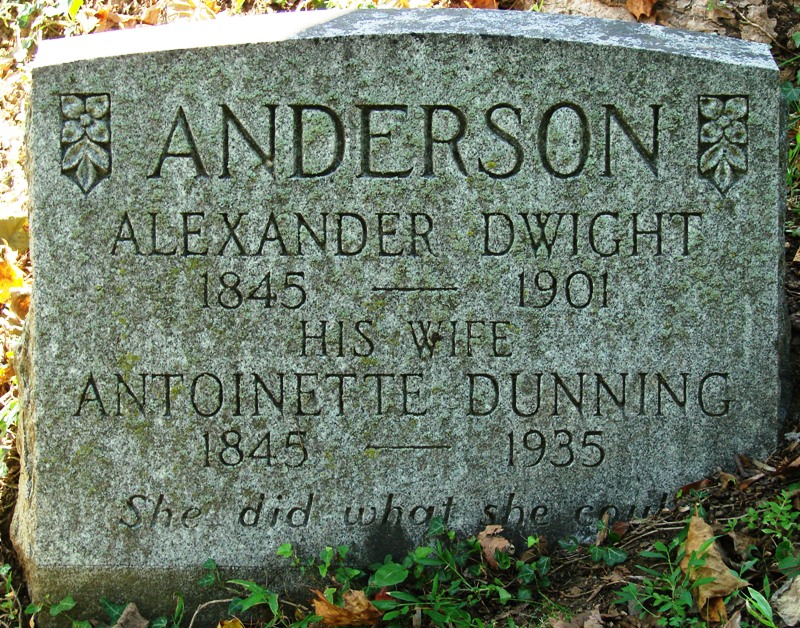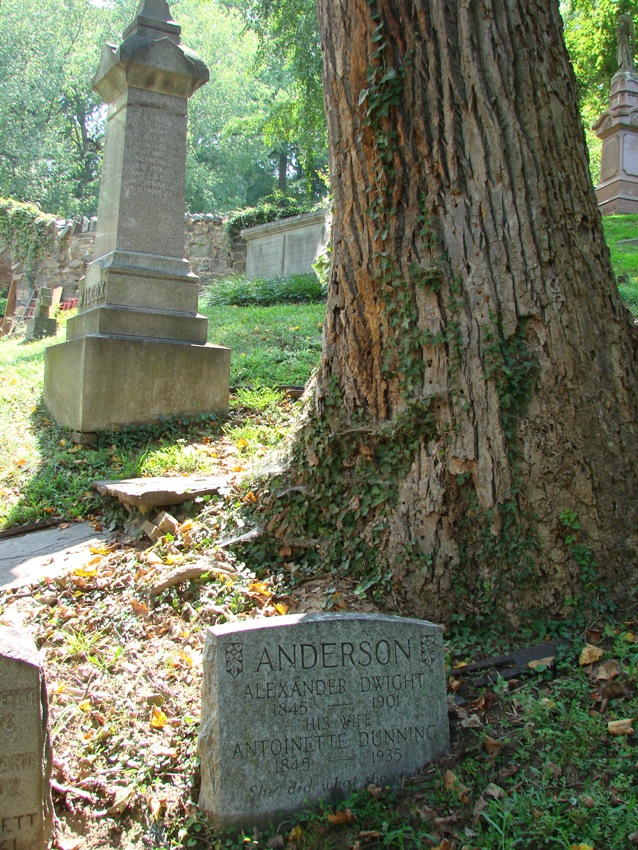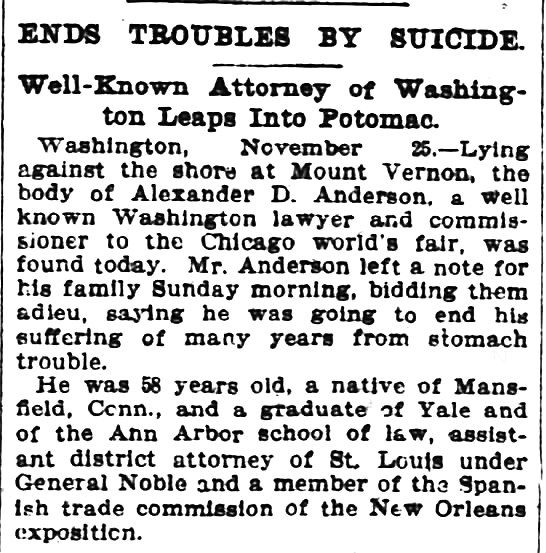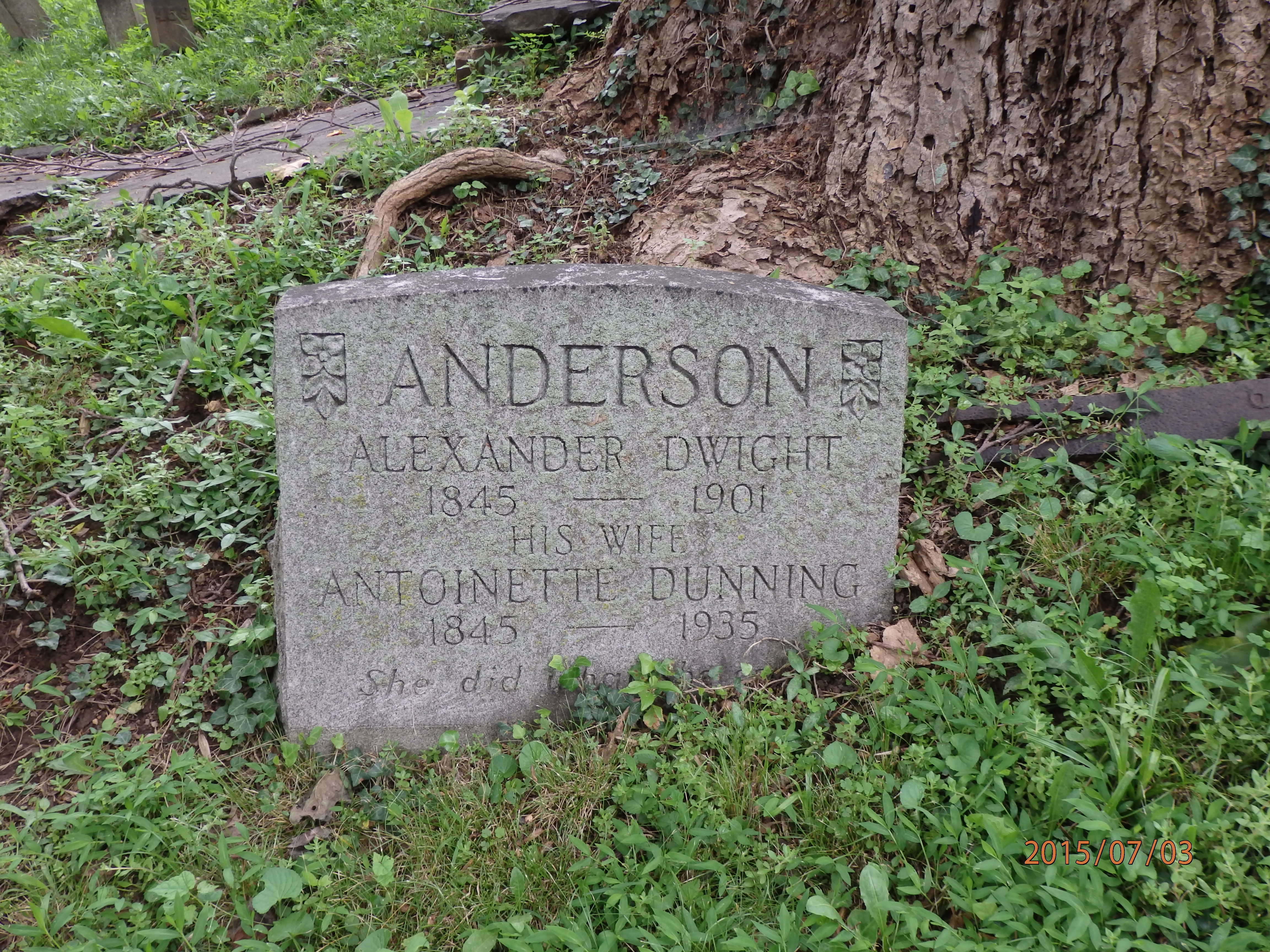The Washington Post November 27, 1901
Died.
Anderson. On Sunday, November 24, 1901, Alexander D. Anderson, aged fifty-eight years. Funeral from his late residence, 309 T Street Northwest, Wednesday morning at 10 o'clock. Friends and relatives invited to attend. Interment private at Oak Hill Cemetery.
The Evening Star November 27, 1901
Washington, D.C., Page 8.
Interment was made in Oak Hill Cemetery this morning of the body of the late Colonel Alexander D. Anderson, who died by drowning near Mount Vernon last Sunday. The funeral services were held at the residence of the deceased, No. 309 T Street Northwest, at 10 o'clock. Rev. A.S. Fiske, D.D., pastor of Gunton Temple Memorial Presbyterian Church, officiated and preached a brief sermon on the life of Colonel Alexander. The pall-bearers were: Messrs. Myron M. Parker and John B. Wight, former District Commissioners; Mr. B.H. Warner, Mr. George C. Gorham, Professor Harry King and Mr. James T. Howenstein.
The Evening Star November 25, 1901
Washington, D.C., Page 10.
Death in the River.
Lying against the shore at Mount Vernon, with the pockets of his coat filled with stones, the body of Colonel Alexander D. Anderson, lawyer, commissioner to the Chicago World's Fair and notable public man, was found this morning at 11:20 o'clock. Two detectives were dispatched to Mount Vernon and the body will be brought back to Washington this evening and conveyed to his late residence, No. 309 T Street Northwest.
Colonel Anderson reached Mount Vernon yesterday morning about 11 o'clock. He passed through the fence some distance from the gate and went to the house of Christian Stout, a laborer, who lives on the grounds. He asked to be directed to the river and he showed him the way through the rear gate. There he asked Thomas Quander to further direct him to the river and Quander showed him the public road that runs to Fairy Landing, on the fishing shore, one-quarter of a mile below Mount Vernon. No one saw him after he left Quander at the gate.
Between 9 and 10 o'clock this morning Thomas McEuen and George Lucas were towing an old house boat up the river and when near Fairy Landing they discovered a body floating in the water, which proved to be that of Colonel Anderson. They towed the body ashore and notified Colonel Dodge, superintendent of Mount Vernon, also Captain Boardman, Chief of the Detective Force in this city and E.S. Wright, Magistrate of Mount Vernon Township and Acting Coroner. Mr. Wright searched the body and found a number of stones in the side pockets of his coat, evidently placed there in order to carry the body to the river bottom. They also found in a pocket a card with Colonel Anderson's name on it and a lead pencil.
The police boat, which went to Mount Vernon this morning, carrying the detectives will return to this city after 4:30 o'clock this afternoon with the body.
Left Note for Family.
The members of Colonel Anderson's family found a note in his handwriting Sunday morning, in which the husband and father bade them farewell and announced that he had gone to end the pain and disquiet from which he had suffered for so many years. Immediately an alarm was sent to the police and a sharp lookout ordered in all sections of the city. This morning's sad tidings were the first [illegible].
For several years Colonel Anderson's health and the practice of his profession have been seriously interrupted by an acute disease of the stomach. His sufferings grew more and more intense until about two years ago when he found himself almost unable to sleep. It is believed this effect of his ailment reappeared several weeks ago and that for a fortnight he had been unable to sleep for more than an hour at a time.
Mrs. Anderson and four children - Dwight Anderson, Edward D. Anderson and Antoinette Anderson all of this city and Storrs Anderson of St. Louis survive him. The arrangements for the funeral have not yet been made. It is expected, however that the funeral services will be held Wednesday.
Born in New England.
Colonel Anderson was a New Englander by birth, a westerner during the earlier years of his professional career and a Washingtonian for the last twenty years of his life. He was born in Mansfield, Connecticut. Fifty-eight years ago. Early in 1866 he graduated with honor from Yale. He then studied for two years in the school of law at Ann Arbor, Michigan and graduated high in his class. His first practice was based in St. Louis, where he served in 1869 as assistant to General John W. Noble, the United States District Attorney and afterward Secretary of the Interior.
[Illegible] with his law practice in [illegible] that followed his St. Louis experience Colonel Anderson devoted himself particularly to the study of the Spanish-American [illegible] not only from a professional but also from a business and literary viewpoint.
He wrote several books - "The Silver Country or the Great Southwest", "The Mississippi and Her Tributaries," "The Tehuantepec Inter-Ocean Railroad, "Mexico from the Material Standpoint," "The Tehuantepec Ship Railway" and "Our Foreign Commerce of the Second Century" all of which were republished by resolution of the Senate in 1890. In 1884 he served as special commissioner of Spanish-American markets for the industrial and cotton centennial exposition at New Orleans.
Project for United Exposition.
When Mr. Anderson came to Washington he was frequently designated as one of the handsomest and most distinguished-looking men in the city. He brought with him from his experience in New Orleans a plan for a united exposition by the three Americas in celebration of the discovery of this continent by Columbus. His plan however was that the celebration should occur in the nation's capital and he worked earnestly to that end. Backed by citizens of Washington and Baltimore he is said to have expanded [illegible] in expanding the movement for a Columbian exposition in Washington.
A public meeting was held here February 27, 1886 when the plan was given formal approval, commissioners were appointed, headquarters were opened and an active and vigorous campaign was begun under Colonel Anderson's direction for the success of the affair. In April 1886 Senator Gorman introduced a memorial presenting the projected exposition for the approval of Congress. By vote of the House of Representatives the fair was located in Chicago. From the testimony of everyone associated with the originators of the movement Colonel Anderson at once congratulated the patrons of the Chicago organization, offered them his services and joined with them to make an unqualified success of the exposition he had originated and which he planned to locate here.
Prominent in Local Affairs.
His genius for organization made Colonel Anderson a prominent figure in local affairs almost from the beginning of his residence here. He was one of the first advocates of a progressive board of trade and became one of its earliest secretaries. He was concerned in many movements for the development and improvement of the city, served as chairman on many committees [illegible] with such objects in view and had an important part in agitating broad schemes for the improvement of the national capital before various Senate and House committees. Of late years his law practice was united with an active real estate business, which he conducted in cooperation with his son, Dwight Anderson.
The Washington Post November 27, 1901
Died.
Anderson. On Sunday, November 24, 1901, Alexander D. Anderson, aged fifty-eight years. Funeral from his late residence, 309 T Street Northwest, Wednesday morning at 10 o'clock. Friends and relatives invited to attend. Interment private at Oak Hill Cemetery.
The Evening Star November 27, 1901
Washington, D.C., Page 8.
Interment was made in Oak Hill Cemetery this morning of the body of the late Colonel Alexander D. Anderson, who died by drowning near Mount Vernon last Sunday. The funeral services were held at the residence of the deceased, No. 309 T Street Northwest, at 10 o'clock. Rev. A.S. Fiske, D.D., pastor of Gunton Temple Memorial Presbyterian Church, officiated and preached a brief sermon on the life of Colonel Alexander. The pall-bearers were: Messrs. Myron M. Parker and John B. Wight, former District Commissioners; Mr. B.H. Warner, Mr. George C. Gorham, Professor Harry King and Mr. James T. Howenstein.
The Evening Star November 25, 1901
Washington, D.C., Page 10.
Death in the River.
Lying against the shore at Mount Vernon, with the pockets of his coat filled with stones, the body of Colonel Alexander D. Anderson, lawyer, commissioner to the Chicago World's Fair and notable public man, was found this morning at 11:20 o'clock. Two detectives were dispatched to Mount Vernon and the body will be brought back to Washington this evening and conveyed to his late residence, No. 309 T Street Northwest.
Colonel Anderson reached Mount Vernon yesterday morning about 11 o'clock. He passed through the fence some distance from the gate and went to the house of Christian Stout, a laborer, who lives on the grounds. He asked to be directed to the river and he showed him the way through the rear gate. There he asked Thomas Quander to further direct him to the river and Quander showed him the public road that runs to Fairy Landing, on the fishing shore, one-quarter of a mile below Mount Vernon. No one saw him after he left Quander at the gate.
Between 9 and 10 o'clock this morning Thomas McEuen and George Lucas were towing an old house boat up the river and when near Fairy Landing they discovered a body floating in the water, which proved to be that of Colonel Anderson. They towed the body ashore and notified Colonel Dodge, superintendent of Mount Vernon, also Captain Boardman, Chief of the Detective Force in this city and E.S. Wright, Magistrate of Mount Vernon Township and Acting Coroner. Mr. Wright searched the body and found a number of stones in the side pockets of his coat, evidently placed there in order to carry the body to the river bottom. They also found in a pocket a card with Colonel Anderson's name on it and a lead pencil.
The police boat, which went to Mount Vernon this morning, carrying the detectives will return to this city after 4:30 o'clock this afternoon with the body.
Left Note for Family.
The members of Colonel Anderson's family found a note in his handwriting Sunday morning, in which the husband and father bade them farewell and announced that he had gone to end the pain and disquiet from which he had suffered for so many years. Immediately an alarm was sent to the police and a sharp lookout ordered in all sections of the city. This morning's sad tidings were the first [illegible].
For several years Colonel Anderson's health and the practice of his profession have been seriously interrupted by an acute disease of the stomach. His sufferings grew more and more intense until about two years ago when he found himself almost unable to sleep. It is believed this effect of his ailment reappeared several weeks ago and that for a fortnight he had been unable to sleep for more than an hour at a time.
Mrs. Anderson and four children - Dwight Anderson, Edward D. Anderson and Antoinette Anderson all of this city and Storrs Anderson of St. Louis survive him. The arrangements for the funeral have not yet been made. It is expected, however that the funeral services will be held Wednesday.
Born in New England.
Colonel Anderson was a New Englander by birth, a westerner during the earlier years of his professional career and a Washingtonian for the last twenty years of his life. He was born in Mansfield, Connecticut. Fifty-eight years ago. Early in 1866 he graduated with honor from Yale. He then studied for two years in the school of law at Ann Arbor, Michigan and graduated high in his class. His first practice was based in St. Louis, where he served in 1869 as assistant to General John W. Noble, the United States District Attorney and afterward Secretary of the Interior.
[Illegible] with his law practice in [illegible] that followed his St. Louis experience Colonel Anderson devoted himself particularly to the study of the Spanish-American [illegible] not only from a professional but also from a business and literary viewpoint.
He wrote several books - "The Silver Country or the Great Southwest", "The Mississippi and Her Tributaries," "The Tehuantepec Inter-Ocean Railroad, "Mexico from the Material Standpoint," "The Tehuantepec Ship Railway" and "Our Foreign Commerce of the Second Century" all of which were republished by resolution of the Senate in 1890. In 1884 he served as special commissioner of Spanish-American markets for the industrial and cotton centennial exposition at New Orleans.
Project for United Exposition.
When Mr. Anderson came to Washington he was frequently designated as one of the handsomest and most distinguished-looking men in the city. He brought with him from his experience in New Orleans a plan for a united exposition by the three Americas in celebration of the discovery of this continent by Columbus. His plan however was that the celebration should occur in the nation's capital and he worked earnestly to that end. Backed by citizens of Washington and Baltimore he is said to have expanded [illegible] in expanding the movement for a Columbian exposition in Washington.
A public meeting was held here February 27, 1886 when the plan was given formal approval, commissioners were appointed, headquarters were opened and an active and vigorous campaign was begun under Colonel Anderson's direction for the success of the affair. In April 1886 Senator Gorman introduced a memorial presenting the projected exposition for the approval of Congress. By vote of the House of Representatives the fair was located in Chicago. From the testimony of everyone associated with the originators of the movement Colonel Anderson at once congratulated the patrons of the Chicago organization, offered them his services and joined with them to make an unqualified success of the exposition he had originated and which he planned to locate here.
Prominent in Local Affairs.
His genius for organization made Colonel Anderson a prominent figure in local affairs almost from the beginning of his residence here. He was one of the first advocates of a progressive board of trade and became one of its earliest secretaries. He was concerned in many movements for the development and improvement of the city, served as chairman on many committees [illegible] with such objects in view and had an important part in agitating broad schemes for the improvement of the national capital before various Senate and House committees. Of late years his law practice was united with an active real estate business, which he conducted in cooperation with his son, Dwight Anderson.
Family Members
Sponsored by Ancestry
Advertisement
Explore more
Sponsored by Ancestry
Advertisement
